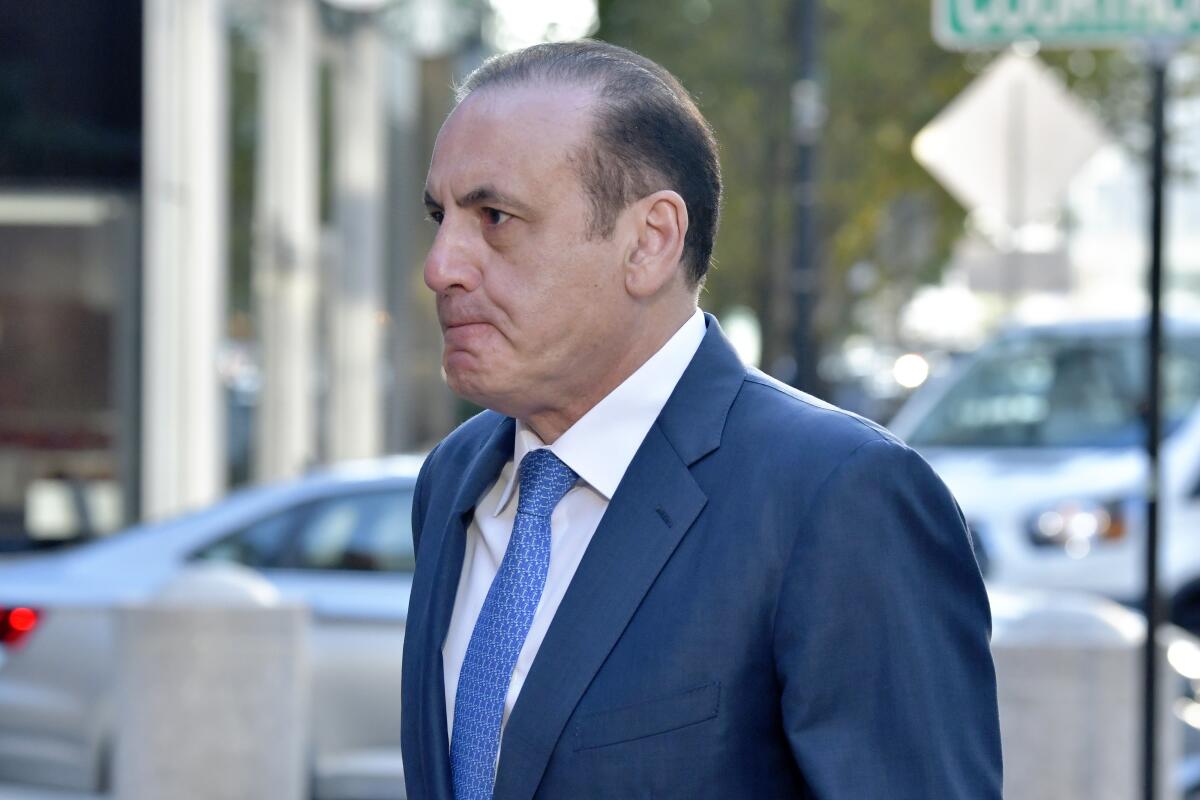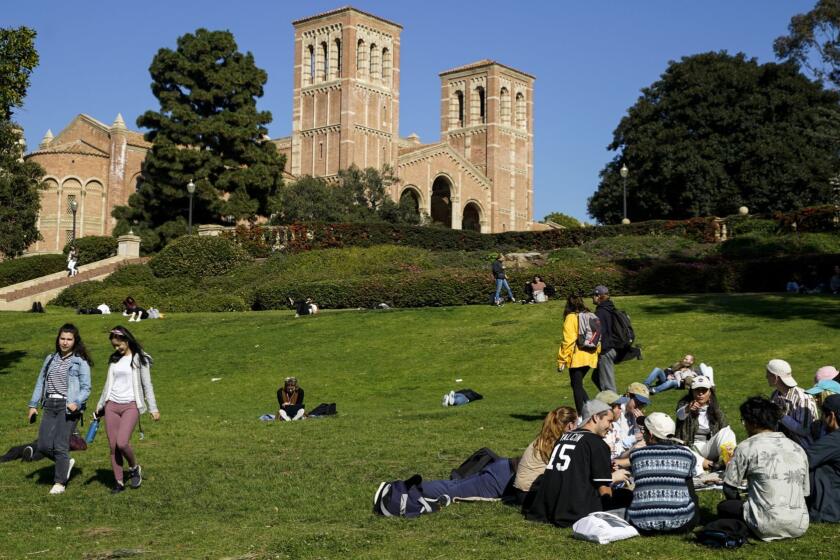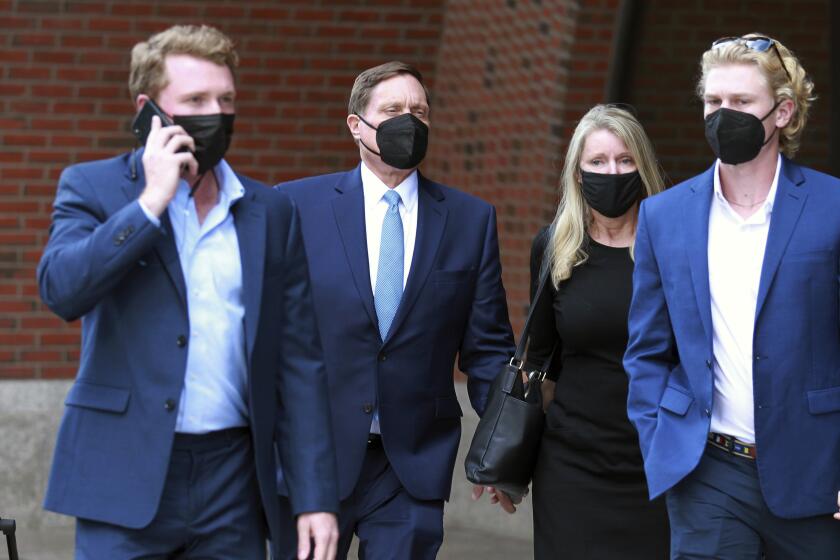Court overturns convictions of first two parents tried in college admissions scandal

- Share via
A federal appeals court Wednesday overturned the convictions of two wealthy businessmen in the “Operation Varsity Blues” college admissions scandal — including by rejecting a central claim of prosecutors that the fathers had knowingly conspired with other parents to buy their children’s way into elite universities.
Both Gamal Abdelaziz, a former Las Vegas casino executive, and John Wilson, a private equity executive, paid self-styled college admissions consultant William “Rick” Singer to get their kids into top schools such as USC, including by presenting them as better athletes than they were, according to court filings.
Singer was sentenced to 3½ years in prison earlier this year for masterminding the scheme, in which he rigged exams and bribed college coaches to secure slots at prestigious schools for the kids of his clients. Abdelaziz and Wilson were convicted of mail and wire fraud and conspiracy to commit bribery in 2021, and sentenced last year to a year in prison and 15 months in prison, respectively.
Students and parents have long suspected that money and connections help win access to top-tier colleges.
However, all of Abdelaziz’s convictions and all but one of Wilson’s convictions were tossed Wednesday by the three-judge panel of the Boston-based U.S. 1st Circuit Court of Appeals, which ruled in a 3-0 decision that they were based on misapplications of the law, unsupported by the evidence presented at trial, or tainted by the introduction of evidence about other Singer clients whom Abdelaziz and Wilson had nothing to do with.
Circuit Judge Sandra Lynch wrote for the court that the government had “failed to prove that Abdelaziz or Wilson agreed to join the overarching conspiracy,” but nonetheless introduced “a significant amount of powerful evidence related to other parents’ wrongdoing.”
That, she wrote, created “an unacceptable risk that the jury convicted Abdelaziz and Wilson based on others’ conduct rather than their own.”
The court also rejected prosecutors’ claim that Abdelaziz and Wilson were guilty of property fraud because they had deprived the universities of property in the form of the “admission slots” that their kids took without merit. Such slots could constitute property, but prosecutors never established them as such in Abdelaziz and Wilson’s trial, the court found.
The court upheld Wilson’s conviction for filing a false tax return, for misrepresenting a payment to Singer as a tax-deductible donation.
Lynch wrote that nothing in the ruling “should be taken as approval of the defendants’ conduct” but that there “are sound reasons to be prudent and cautious about criminalizing conduct, even unethical conduct, in this complicated area affecting so many students and parents.”
The office of Massachusetts U.S. Atty. Rachael Rollins, which prosecuted the case, said in a statement Wednesday that it was reviewing the opinion and “assessing next steps.”
Noel Francisco, an attorney for Wilson, said they were examining next steps but were pleased with the decision.
“It confirms what we’ve known from the beginning — John Wilson’s case is fundamentally different from others in the broader Varsity Blues scandal,” Francisco said.
He said Wilson’s children were qualified for admission to the schools on their own merits, and the money Wilson paid did not go “to enrich any coach but, rather, was directed to the schools themselves.”
Joshua Sharp, an attorney for Abdelaziz, said his client was grateful the appeals court “recognized that his trial was profoundly flawed” and reversed his convictions.
“My client wasn’t in a conspiracy with people who he never knew, and his trial was fundamentally unfair because it relied on evidence of other people’s misconduct,” Sharp said. “He’s maintained his innocence since Day One.”
More than 50 people were charged in the scandal, including TV actors Felicity Huffman and Lori Loughlin and Loughlin’s fashion-designer husband, J. Mossimo Giannulli — who were among dozens of people who pleaded guilty in the case.
Abdelaziz and Wilson were the first of Singer’s clients to go to trial.
The first trial began with defense attorneys seeking to portray the two parents accused of buying their kids way into school as victims of con man who believed their payments were legitimate donations.
Abdelaziz was accused of paying $300,000 to get his daughter into USC as a basketball recruit, while Wilson was accused of paying $220,000 to get his son into USC as a water polo recruit and $1 million to get his twin daughters into Harvard and Stanford.
Both men admitted to paying Singer but said they believed that what they were doing was allowed.
“Their defense at trial and on appeal is that they believed Singer’s services and the side door to be legitimate and that they acted in good faith,” Lynch noted in her opinion.
Prosecutors disagreed, as did the jurors who heard their case.
In February 2022, Wilson was sentenced to 15 months in prison and Abdelaziz was sentenced to just over a year in prison, with each followed by two years of supervised release, plus community service and fines.
Wednesday’s court ruling leaves open the possibility of Abdelaziz and Wilson being retried on a narrower set of criminal counts, though legal experts said that would be difficult.
More to Read
Sign up for Essential California
The most important California stories and recommendations in your inbox every morning.
You may occasionally receive promotional content from the Los Angeles Times.
















